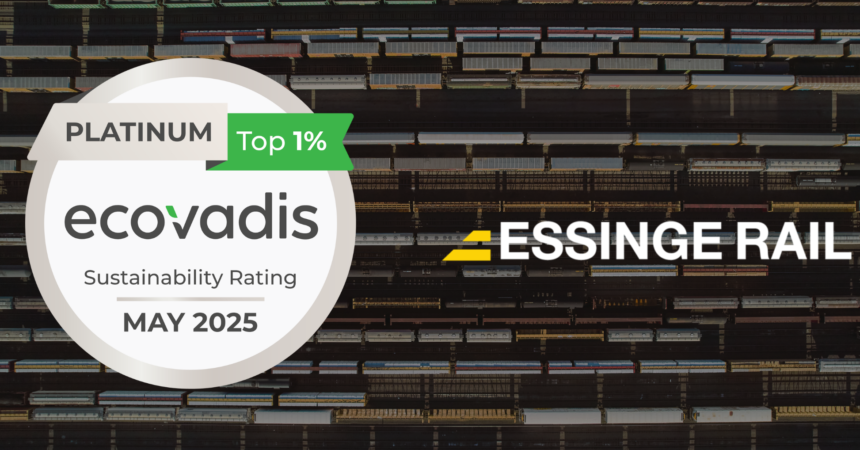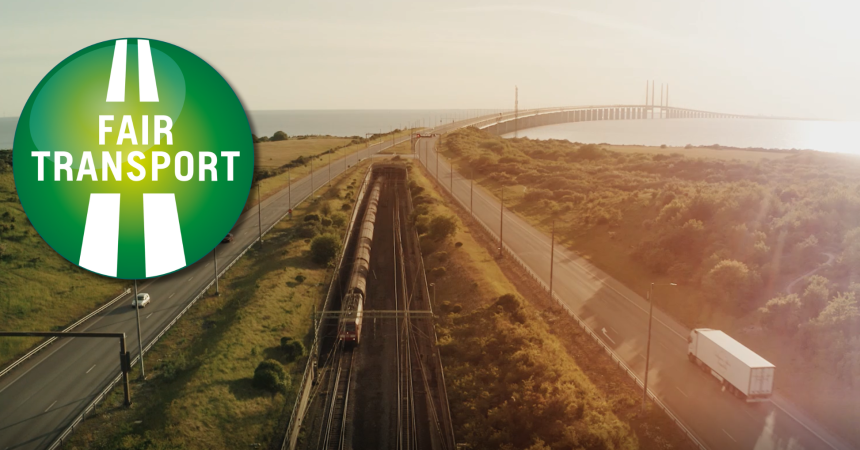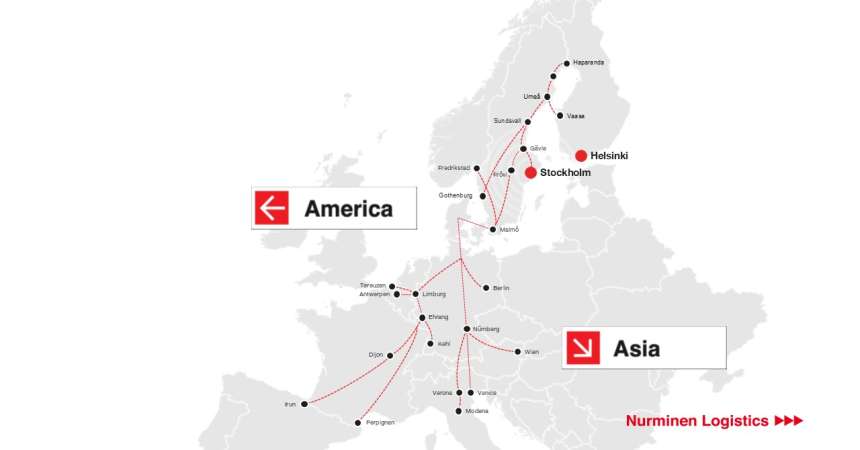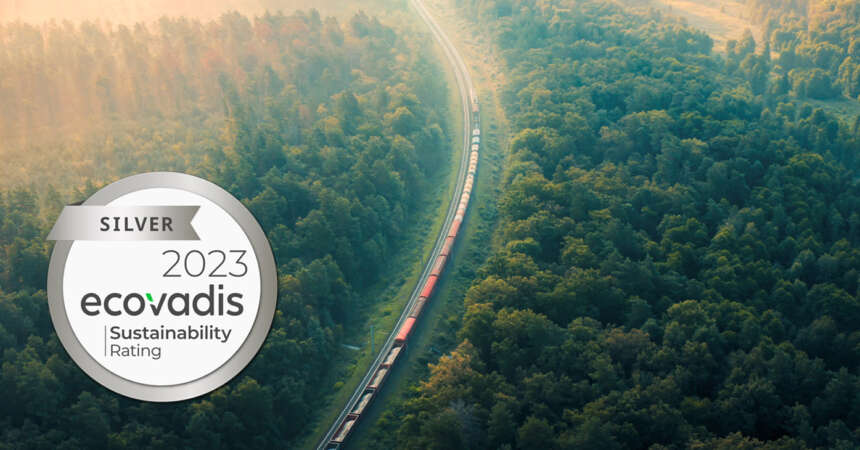The transport sector in changing times
In these times, many companies are experiencing major challenges in meeting their climate targets due to changing fuel prices and global crises affecting society at large. Our analysis is that there has never been a better time for companies to switch to sustainable freight transport and thus primarily rail-based transport for their goods. The reason is that we cannot actually know for sure whether economic fluctuations and global crises will cease in the foreseeable future. At the same time, according to the Paris Agreement, Sweden is to achieve stated climate targets, which means that greenhouse gas emissions from domestic transport will be reduced by at least 70% by 2030 compared to 2010[1].
This leads us to the view that rail transport is a more stable transport solution, and thus more sustainable, both from an economic and a sustainability perspective.
Sustainable door-to-door freight transport
What we find is that transport buyers have difficulty finding a supplier who can deliver a complete solution in an environmentally friendly way. In order to reduce administration and keep a good cost picture, most are looking for a supplier who can provide a door-to-door solution. For those companies that transport larger volumes, Essinge Rail can be an excellent option for customers who require just that. Thanks to our transport management system, everyone can track their orders in real time. There is no need for special shipping or consignment note numbers, just your own order number. We will provide you with a login ID and password. See the current location in plain text or zoom in on the map of Europe. All this is made possible by the fact that all wagons are equipped with GPS transmitters.
We are proud of our environmental profile and would say that the vast majority of new customers save both money and make great environmental gains by starting with sustainable freight transport via Essinge Rail.
An example of this is that our transport generally emits 90% less CO2 than road transport[2].
Train or truck transport?
There is no longer any discussion regarding the advantages of rail versus truck from an environmental point of view. What indicates that trucks are still a sustainable mode of transportation is for shorter distances and in combination with environmentally friendly fuels such as HVO-100, which Essinge Rail uses. Or of course the even better alternative, electrically powered trucks. It is undoubtedly positive that trucking as an industry is undergoing a transition to a more green method of transportation. However, today it is not as fast as many had hoped, and rail will always be a faster, safer and more cost-effective way to transport heavy objects over longer distances.
Sustainable freight transport is the future
Since transportation accounts for 30% of Sweden's C02 emissions, it is a crucial factor in our common challenge towards a more sustainable society.[3] Of the thirty percent, cars and heavy vehicles account for most of the emissions. As a company, making a conscious transition to a combination of electric train transport and environmentally friendly truck transport provides direct environmental benefits. You show that your company takes responsibility for the environment and society, and the best part is that it doesn't have to cost more than your current solutions. What we find is that, in most cases, the opposite is true. Either all at once or over time.
We at Essinge Rail are always very careful to present a complete economic and environmental plan to our partners. We are committed to the environment and want to work with companies that share that view. Finally, we have arranged for all our customers to receive a statement of CO2 emissions for each individual transport order in the invoice. The figure is in kg.
EcoVadis and our environmental commitment
In 2021, Essinge Rail was awarded a silver medal by the prestigious rating agency EcoVadis, confirming our persistent commitment to sustainable and environmentally friendly freight transportation. This success is particularly noteworthy as we have not only maintained our high rating from previous years, but have also increased our rating despite increased demands. EcoVadis, an institute with the vision of integrating sustainability aspects into corporate decision-making, has evaluated no less than 90,000 companies in 2021. Essinge Rail was part of the exclusive group of the 18% best-rated companies in all categories. In the category of environmental work, we ended up among the 4% most sustainable companies.
The latest results from the 2023 survey speak for themselves. With a total score of 69 out of 100 possible, Essinge Rail has risen to the top 7% in all categories among all participating companies. In the area of the environment, we achieve a score of 70. Similarly, we have achieved a score of 70 in human rights and ethics. With a resolute focus on continuous improvement, we are determined to raise the bar and achieve even higher scores in all areas.
A positive difference
EcoVadis focuses on four critical areas: environment, human rights, ethics and sustainable procurement. Essinge Rail has shown outstanding commitment in each area and this has resulted in noticeable differences in the company's rating in a very short time. It is worth noting that EcoVadis evaluates companies not only to recognize their efforts, but also to push them towards further development and sustainability. Essinge Rail accepts this challenge with open arms and does not want to be just a passive participant, but we are constantly working to strengthen our position as a leading player in sustainable freight transport. For more detailed information about EcoVadis and their work, you can visit their official website at ecovadis.com. Here you can also discover how other companies and organizations around the world are striving to make a positive difference and create a better world for future generations.
Switch to sustainable freight transport
There are many reasons to choose rail as a primary transportation solution. But one of the biggest reasons is that companies that prioritize sustainability gain growth and goodwill from it. Our society is undergoing an electrification of the vehicle fleet, and sustainability is high on the list of priorities for both individuals and companies, but especially for decision-makers. Policies are investing in rail and subsidizing rail transport. At the same time, charges for fossil-based transport are planned. The trend is clear - sustainable transport is the future.
When choosing new partners, there are now clear incentives to choose the more environmentally conscious company. We have helped several well-known and global companies in their journey towards more environmentally friendly transportation.
Contact us at Essinge Rail and we'll help you reach your climate goals.
Intermodal and multimodal transport
In logistics, both intermodal and multimodal transport are crucial to create efficient, profitable and environmentally friendly transport solutions. By combining different modes of transport such as rail, road and sometimes even sea and air, goods can be moved more smoothly over longer distances. This integration not only minimizes the time goods spend in transit, but also reduces the CO2 footprint compared to less optimized transport methods.
Difference between intermodal and multimodal transport solutions
The difference between intermodal and multimodal transport lies in how the goods are handled and how transport responsibilities are organized between different modes of transport during the delivery process.
Intermodal transport
Intermodal transport solutions mean that goods are transported from a starting point to a final destination in a single load-carrying unit, such as a container or trailer, without the cargo itself being handled as it moves between different modes of transport such as truck, train or ship. Each segment of the journey can be handled by different freight companies, but the packaging or container of the goods remains intact. This reduces the risk of damage and speeds up the whole transportation process, as the goods do not need to be reloaded at each change of mode.
Multimodal transport
Multimodal transport solutions, on the other hand, also refer to the use of two or more different means of transport, but differ from intermodal transport in that it may involve several different cargo handling operations, where the goods may be repacked during the journey. The unique feature of multimodal transport is that a single carrier takes full responsibility for the entire transport from start to finish, regardless of how many different means of transport are used. This carrier, often referred to as a multimodal carrier or logistics operator, manages all the logistics arrangements and bears the legal responsibility for the entire transport.
We at Essinge Rail offer both options and always adapt to the customer's specific needs and conditions.
Long-distance transport as a method of transporting large volumes of goods
This method of transportation, in which we have extensive experience, involves large volumes of goods transported across national and international borders. The shipping method requires careful planning and efficiency to keep logistics costs down. Among other things, it involves good knowledge of EU rules and permits for smooth movement between borders and customs. Examples include: ECMT authorization and CMR waybill. With increased globalization and complex supply chains, the ability to effectively manage these shipments is more important than ever.
Part loads and general cargo
For large volume shipments, the following classes of freight are usually involved: Partial loads are goods and cargo, usually on pallets, weighing over 1000 kg. General cargo is goods, usually in cartons or packages, weighing less than 1000 kg. These transportation methods allow companies to adjust their deliveries to current demand without overpaying for unnecessarily large shipments. This is particularly important for small and medium-sized businesses seeking cost efficiency without sacrificing delivery reliability.
Co-loading for increased profitability in freight transport
By consolidating smaller batches of LTL (Less than truckload) goods, companies can benefit from cost savings, while contributing to more sustainable logistics. Unlike FTL (Full truck load), where entire trucks or train wagons are reserved for a single load, LTL serves an important function where multiple shippers share the same space. Through our transportation solution, companies can share a wagon with other companies and thus get a good freight price. This is clearly advantageous from both economic and environmental aspects.
Supply Chain Management creates a smooth transport chain
Effective supply chain management is essential to ensure that all stages are optimized for maximum efficiency and minimum environmental impact. Modern SCM technology includes real-time monitoring and advanced data analysis tools, which not only track goods but also predict and manage potential disruptions before they affect the supply chain.
By staying one step ahead and working with transport systems, we can minimize unnecessary stops and plan the route in an optimal way. Sometimes an accident can lead to a need to re-plan the entire route, saving a huge amount of time. The key is to access the information in time and understand how we can act to help our customers achieve good and reliable transportation times.
Essinge Rail develops green corridors for a green future
Green corridor initiatives, which focus on minimizing the environmental impact of transport through strategically planned and efficient routes, are at the heart of the global drive towards more sustainable logistics. These corridors use high-tech solutions and cleaner energy sources to create a more environmentally friendly transportation process. By embracing these technologies and strategies, together we can build a more sustainable and efficient future for the freight transportation industry. We at Essinge Rail are determined to lead the way towards a greener and more profitable logistics solution for all our existing as well as new customers.
Contact us to find out more about how we can help you minimize your carbon footprint while helping you achieve more cost-effective logistics.
Our commitment to climate and sustainability
- EcoVadis Silver Medal, read more
- Affiliated to Fair Transport according to added value level 2, read more
- Affiliated with the Science Based Targets initiative for scientifically measurable climate targets that comply with the Paris Agreement, read more
Footnotes
[1] https://www.naturvardsverket.se/amnesomraden/klimatomstallningen/sveriges-klimatarbete/sveriges-klimatmal-och-klimatpolitiska-ramverk/
[2] https://www.neste.se/neste-my-fornybar-diesel/hvo
[3] https://bransch.trafikverket.se/om-oss/var-verksamhet/sa-har-jobbar-vi-med/Miljo-och-halsa/Klimat/









